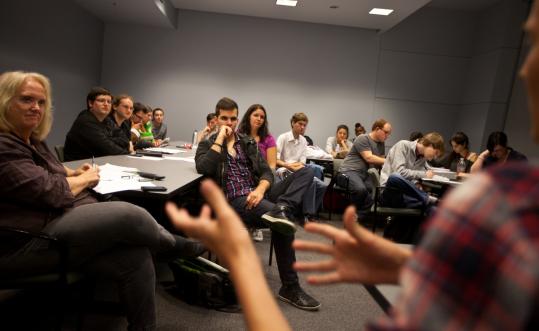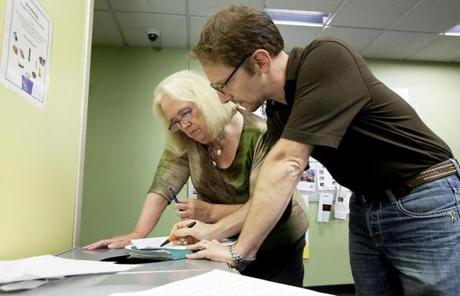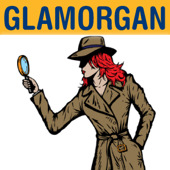Dans la presse
FRIDA Quand le magazine SCRIPT voulu en savoir plus sur la façon par laquelle FRIDA était créé, ils ont demandé à Diane à décrire comment elle a ramené à la vie le personnage étonnant de Frida Kahlo. Cliquez ou cliquez droit ici pour télécharger et lire l'article.
Le chemin d'un Scénariste: octobre 2016 Diane était dans LA en octobre 2016 et a pris l’occasion de signer quelques copies de son nouveau livre The Screenwriter’s Path. C'était une occasion probablement unique dans toute l’histoire des évènements pareils.
Mai 2016: Natfluence publie cette interview avec Diane.
From the front-page of the Boston Globe, 20 October 2011:
Colleges strike common chord
Class on musicals blends talents
By Linda Matchan

Emerson student Tim Zientek pitches a story idea to “Writing the Film Musical” classmates
(ERIK JACOBS for the BOSTON GLOBE).
The writing class started much like any other. In the first half of the screenwriting exercise, Emerson College students discussed plot development, effective characters, and establishing conflict.
Then they added music. They moved to another classroom, where they joined students from Berklee College of Music. One played a flawless riff on the piano. Another sang and tap danced. Several intensely studied musical scores.
The students are part of an unusual hybrid class jointly offered by the colleges. The course, “Writing the Film Musical,’’ pairs Emerson’s screenwriting students with Berklee’s music students to work on pieces of a musical screenplay that will ultimately be performed before an audience.
The idea originated with Emerson screenwriting professor Diane Lake, who thought that exposure to musicals would help her students think about writing in a different, more creative way.
“I am full of crazy ideas,’’ said Lake, whose 2002 film “Frida” - her first big writing assignment - won two Academy Awards.
Undeterred by the fact that her own formal music education ended at age 5 when her parents sold the family piano, she reached out to Berklee professor Michael Wartofsky, whom she’d been told had a musical theater background.
Together they drafted a proposal, which won a $3,000 grant for “the most engaging and innovative course” from the ProArts Consortium, an association of six Boston-area visual and performing arts colleges that aims to facilitate cross-college collaboration. The students are working in pairs to write and compose music for an act from a musical. Highlights will be performed for the public on Dec. 13 at Emerson’s Paramount Theatre.
It’s not uncommon for students enrolled at one college to take courses at another nearby. But it’s rare for two colleges to team up for the same course, especially schools as different as Emerson and Berklee.
They may be close to each other geographically - 1.2 miles, to be precise - but in terms of culture they are miles apart. Emerson pumps out communications majors; Berklee’s mission is to create revolutionary musicians. Emerson’s writing students fret over plot and dialogue. Berklee’s think in terms of tempo and melodic themes.
“Your toolbox contains your personal vocabulary and 12 notes,’’ said Rafael Sanchez, a Berklee student taking the class. “The rest is pure creativity.”
There aren’t many obvious points of intersection between the two worlds. But Lake and Wartofsky thought they could find common ground in musicals, thanks to a resurgence of interest in the genre inspired partly by Fox’s hit show “Glee’’ and by a spate of musical films.
“Every high school on the planet is doing their version of ‘High School Musical,’ ’’ Lake said.

Emerson professor Diane Lake and Berklee professor Michael Wartofsky
Wartofsky believes musical films with strong social themes like “Moulin Rouge,’’ “Chicago,’’ and “Rent’’ shifted public opinion about musicals, which had lost their luster in the 1970s and ’80s.
“They showed that movie musicals could be very cool and hip,’’ said Wartofsky, whose own credits include writing the music for “Cupcake’’ and “Car Talk: The Musical!!!’’
The course started this fall, with 12 students enrolled from each college. They meet once a week on Tuesday nights, alternating schools.
Initially there wasn’t much interaction between the two groups; the students sat clumped together by school. Some of the Emerson students had trouble relating to the music conversations.
“They were talking about things like vamps,’’ recalled Ethan Young, an Emerson student.
In one of the first classes, the topic was an analysis of “Chicago.’’ Lake discussed screenplay structure. Wartofsky talked about song placement and song “moments,’’ and the way songs can tell a story.
“Then [Wartofsky] goes to the piano and we start singing lyrics,’’ said the perpetually effusive Lake. “And here are my students - the playwrights, the film writers, the writers of short stories. And they are singing! My kids don’t sing! It’s a new way to tell a story through song.’’
Things got tougher the next week, as the students split into screenwriting and songwriting teams. Working in pairs, Emerson students were charged with writing the first act of an original screenplay. (“The title should kill,’’ Lake told them.) Berklee students were assigned to write songs to help tell that story.
To simulate the competitive nature of the entertainment business, screenwriters would try to sell their idea to the musicians in a compelling, five-minute pitch in the hope that their script would be picked. “We’re trying to create a little bit of an industry vibe here,’’ Wartofsky said.
The pitches came a week later, and they were nothing if not inventive. Lorena Mora and Young pitched “The Swamp Thing,’’ about a supernatural creature in a Mississippi swamp. Michael Giese and David Ladr offered up “Starving Artists,’’ about a down-on-his-luck circus performer who takes a gig eating a metal sculpture. Neil McNeil and Tim Zientek pitched “One Killer Musical’’ about a serial killer in a musical theater.
Some of the writers apparently hadn’t quite grasped the concept of song placement. One team forgot to leave room for any music. Another accounted for an implausible plot twist by promising it would be preceded by a “song moment.’’
But the musicians had no problems seeing potential.
“I’m seeing old American military music,’’ said Sanchez, 21, who taught himself to play several instruments by ear and has so many ideas for melodies he said he has to memorize them or sing them into his phone. He and his partner Don Ngatia were charmed by “One Killer Musical,’’ seeing strong potential for uptempo blues music and 1930s-inspired jazz.
The Berklee students got only a week to create lyrics and music for a song for two different screenplays. Sanchez, who played piano, and Ngatia, who sang, performed a tango called “Let’s Dance.’’ They thought it would be a haunting way to establish the killer protagonist. (“There’re so many ways to die - I mean dance, tonight/Mambo, tap or tango, what’s your delight. /So what if when we dip you may slip, never to rise?’’)
Some of the Emerson students were so impressed with the musical renderings of their stories they were close to tears.
“We got a tad emotional during the song pitches,’’ said Mora, who is majoring in film and television writing.
A few weeks into the course, it was hard to tell they were from different schools. Said Zientek: “We’re weirdly similar.’’
Diane a été interviewé juste avant la perfomance. Vous pouvez écouter l'interview en cliquant sur le lecteur ci-dessous.
23 juin 2010 - DIANE donne une conférence à PARIS, FRANCE
Pour leur série 'Soirées avec un Auteur', Diane a donné une conférence à la Bibliothèque Américaine à Paris sur " L'Art du Scénario " en juin 2010. Lire le blog de Diane ici.
Novembre 2007 - GRèVE de la Guilde des Écrivains
WGBH a interviewé Diane le premier jour de la grève de la Guilde des Écrivains, pour son analyse de l'impact que cela aurait sur l'industrie.
Diane a également été interviewé par IMAGINE Magazine pour son avis sur la grève. On peut télécharger l'article ici
2007 CONFÉRENCE pour DES Écrivains à MAUI
Diane était une invité spéciale lors de cette prestigieuse conférence à la fin d'août 2007. Elle a parlé sur " Ecrire 10 premières pages époustoufflantes " et " Comment vous rendre au cœur de vos personnages ", ainsi que de travailler avec élèves en 'workshop'. On peut voir une liste de toutes ses conférences ici.
Les Oscars 2007
Diane a été interviewé par The Boston Globe sur ses réactions aux Oscars en 2007. Lire ses idées, ainsi que celles d'autres professionnels de l'industrie.
